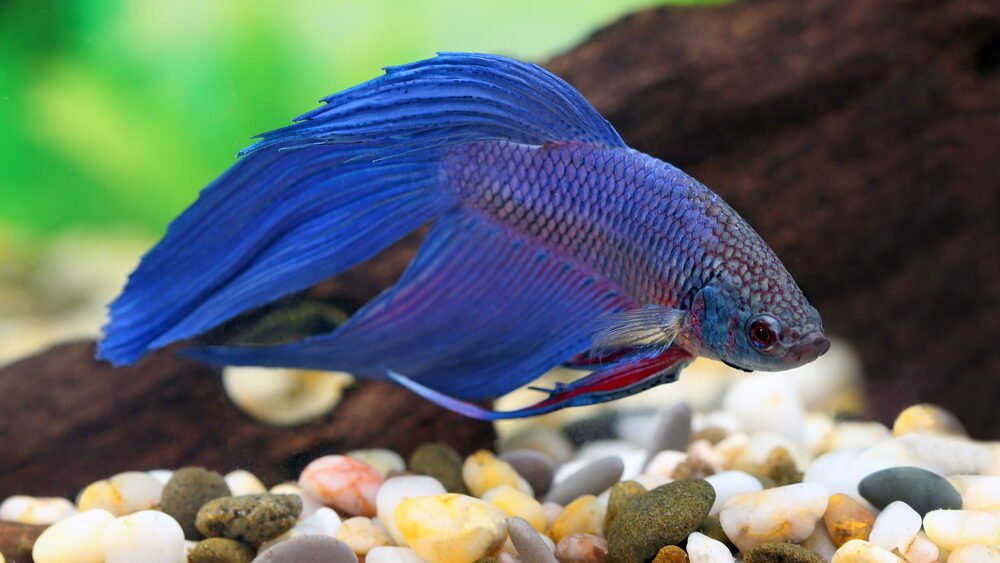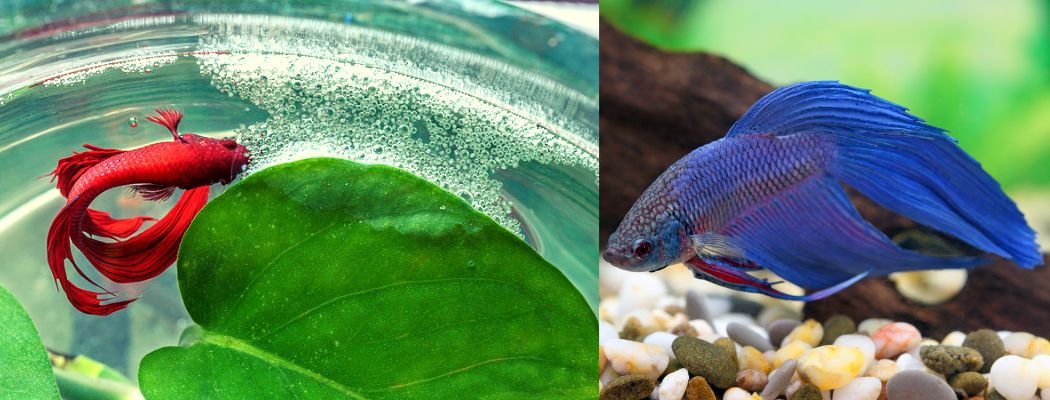Can Female Betta Fish Get Pregnant and Lay Eggs Without a Male?
Can a female betta fish get pregnant by itself without a mate and lay eggs without a male? The answer may shock you and is more complex than you think. Let’s dive into the topic of female betta breeding, reproduction, fertility, and tips on caring for your pregnant betta and newborn fry.
Betta Reproduction and Breeding Habits
If you want to be a good betta fish owner, you should make an effort to understand the fish and their unique breeding habits.
Breeding ritual and building a bubble nest

Did you know that males and females often engage in courtship rituals before they mate?
The male builds a “bubble nest” by creating foamy air bubbles and may use floating plants to keep it together near the surface. The female then accepts or rejects the male. If she accepts the nest, she will release the eggs in the bubble nest. A gravid betta can lay anywhere from 100 to 500 eggs.
The male’s role in protecting the eggs
The male then fertilizes the fish eggs, and from then on, it is the male’s role to guard the nest and protect the eggs until they hatch after about three days, which is the betta fish gestation period. The betta eggs hatch into live young fish called “fry.”
Female and male betta fish characteristics
You can easily differentiate between the male and female betta by their appearance. Male bettas have longer fins and tend to be more active with flaring and showing off their aggression or dominance, while females tend to be more relaxed and have less vibrant colors.
Can female betta fish get pregnant without a mate?

A female betta may produce eggs, carry eggs for 1-2 weeks, and then release eggs without a male. However, unfertilized eggs won’t hatch into a new generation of siamese fighting fish.
The betta fish reproduce through external fertilization, which means that the female fish becomes pregnant (gravid female) without a male fish, lays eggs from her ovipositor without a male, and then the male releases sperm on the eggs outside of the female’s body which fertilizes the eggs.
Alternative methods of betta fertilization
There are other ways to fertilize betta eggs and breed their fish without relying on a male. Some methods are:
- Bubble nest fertilization is when you transfer some eggs from the female’s tank to the male’s tank. The male may start building the bubble nest, which you can place the eggs in, and the male fertilizes and protects them until they hatch.
- Cup spawning is when you put the eggs in a container, such as a jar or a cup, together with the male’s sperm. The eggs fertilize in the container.
- Hormone injections can stimulate a female betta to start producing eggs, but experts don’t recommend it for hobbyists. Fish farms often use this method to make fish eggs for caviar as it increases production and extraction.
- Manual stripping is a method of massaging and stroking a sexually mature fish on the abdomen to squeeze the eggs or germ cells out or to stimulate the male fish to release sperm from the gonad. Fish farms also use the technique to produce caviar to extract eggs without harming or killing the fish.
Factors that affect a female’s fertility

Factors that can affect a female’s fertility include:
- The time between breedings. It will take at least two weeks until a female is ready to breed again after having laid eggs.
- Age: Bettas reach sexual maturity after three months, but the ideal age is six to eight months.
- Health: Any health problem can negatively impact a fish’s fertility. If your fish is sick, you may need to check if oxygens levels are ok, if there are any pollutants or possible diseases, or if the environment is harmful.
- Nutrition: Proper nutrients are vital for health and fertility, and you can feed bettas frozen or freeze-dried foods that are rich in vitamins.
- Quality of water: A clean environment and proper water conditions your betta can live in can make a difference. If the water is terrible, change the water, clean the tank, and check that your filtration system is working.
- Stress levels: Fish are easily scared or stressed. Any irregularities in the habitat or environment can stress the fish, and they may struggle to acclimate to quick or significant changes. Overcrowding or other aggressive water animals may be threatening.
If these factors are slightly off, it could negatively impact the betta’s fertility. You can maximize the breeding success of your bettas by considering all of these factors.
What to do after your betta fish gives birth

When your betta has given birth to fry, there are a few steps you, as a responsible owner, should take to ensure the safety and health of the babies in the long run.
Show care for your baby fish by giving them enough food and ensuring they have enough space in the tank, with hiding places to hang out and chill.
Also, a big challenge you face is to prevent overpopulation. Suddenly 100+ baby fish are born, and you may have to separate them into several tanks to avoid overcrowding your small tank. But having multiple tanks also poses a more significant challenge in managing all the tanks, their habitats, and living conditions.
But overpopulation is also a considerable risk to the tank’s habitat and water conditions. Check the water temperature, inspect the filtration system and monitor the pH levels. The best way to avoid overpopulation is to remove excess fry before they mature.
By properly caring for your fish, you’ll be giving your bettas a safe home which they would be grateful for (if they had the capacity for such feelings)
Frequently Asked Questions about Betta Fish Fertility and Reproduction
How long are betta fish pregnant?
Female bettas are pregnant for 1-2 weeks, which is the time they produce and carry the eggs before releasing them.
Does the betta eat their eggs?

A betta may eat their eggs, especially if the spawning fails or the eggs are left unfertilized. There may be several reasons for a failed spawning, such as not having a male around to fertilize them or due to other mating or fertility problems.
It is less common for a fish to eat their fry (young baby fish), especially when food is abundant. But it could happen in extreme cases of hunger or aggression and conflict.

